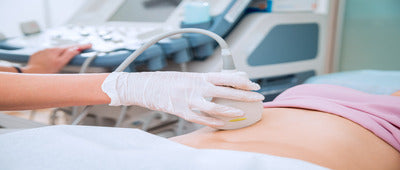In the UK, around 1.5 million women live with endometriosis, and underdiagnosis could mean that number is even higher. Endometriosis can cause many health problems, including decreased fertility.
However, fertility treatment can help you conceive and start your family. Discover more at IVF Matters and discover the best fertility treatment for endometriosis.
What is endometriosis?
Endometriosis is a lifelong condition caused by the womb’s lining growing in other areas of the body, such as the ovaries and the fallopian tubes. Around 1 in 10 women and those assigned female at birth are diagnosed with endometriosis, which is more common than people realise.
Endometriosis can impact women of any age, and the symptoms can be tough to deal with.
Common symptoms of endometriosis can include:
- Pain in the lower abdomen and back that gets worse during your period
- Debilitating period pain
- Pain during or after having penetrative sex
- Pain when urinating or emptying your bowels during your period
- Nausea, constipation, diarrhoea, and blood in your urine or stools when on your period
- Struggles with falling pregnant
- Very heavy periods
Endometriosis symptoms can’t be cured, but they can be managed with pain relief medications, surgery, and even hormone therapy.
Diagnosis of the condition is made during laparoscopy. The surgeon inserts a small camera on a thin tube into the abdomen through an incision so they can see the endometriosis tissue. This is the only way to diagnose the condition.
Stages of endometriosis
Endometriosis can be diagnosed at different stages. These stages are:
- Stage 1 – the condition has had minimal impact and there is little to no scar tissue in the body
- Stage 2 – increased tissue growth outside the womb and there may be some scar tissue
- Stage 3 – deep tissue grows outside the womb. Cysts may also have developed and thick scar tissue has grown
- Stage 4 – the most widespread growth of tissue outside the womb, and extremely thick scar tissue. Large cysts may also have developed on one or both ovaries.
Endometriosis doesn’t always move from one stage to the next. If untreated, it can stay at the same stage. However, it can get worse.
Does endometriosis affect fertility?
Endometriosis can cause fertility problems, though it’s not fully understood why. It may be due to damage to the fallopian tubes or ovaries, which makes it difficult to conceive.
Surgery can sometimes be an option for those who can’t get pregnant, as it can remove the endometriosis tissue — although it’s not guaranteed that surgery will work.
However, not all women with endometriosis will struggle with conceiving, and they may be able to fall pregnant without treatment.

Getting pregnant with endometriosis
It’s been estimated that between 60%–70% of women with endometriosis can fall pregnant without fertility treatment. However, there is a lack of research in this area, so the links between fertility and endometriosis aren’t fully understood.
Just because the rate of falling pregnant naturally seems high, it doesn’t mean the pregnancy will always be successful. Unfortunately, miscarriages can happen to any pregnancy. It occurs in around 1 in 4 pregnancies when you are diagnosed with endometriosis, compared to 1 in 5 without the condition.
Ectopic pregnancies can also occur, but women with endometriosis are at more than double the risk of ectopic pregnancy compared to those who don’t have the condition.
Falling pregnant naturally can happen when you have endometriosis, but it’s not always possible and sometimes help via fertility treatment is necessary.
Fertility treatment for endometriosis
Fertility treatment for endometriosis requires an individualised approach, as the condition doesn’t affect every woman in the same way.
The type of fertility treatment needed will also depend on the stage of your endometriosis, so a consultation with your chosen fertility clinic is essential.
Intrauterine Insemination (IUI)
Intrauterine Insemination (or IUI) is a recommended fertility treatment for women with stage 1 or stage 2 endometriosis. IUI is a method of artificial insemination and involves a sample of filtered sperm placed into the uterus at the time of natural ovulation.
IUI can be done using your partner’s sperm or donor sperm — making it suitable for those in same-sex couples and single women. IUI is minimally invasive, very safe, and often successful, which is why it is often the first choice of fertility treatment for those with endometriosis.
In-vitro fertilisation (IVF)
In-vitro fertilisation (IVF) is one of the most well-known fertility treatments. It can be a successful option for women with endometriosis.
The IVF procedure involves an egg, either your own or a donor’s, being fertilised with sperm in a laboratory. The fertilised embryo is then placed back inside the womb to implant and potentially lead to pregnancy.
The success rate of IVF in women with endometriosis can vary. Again, IVF is most often recommended to women with stage 1 and stage 2 endometriosis, as the other two stages often make it harder to conceive. However, that doesn’t mean it can’t be attempted — IVF can still lead to a successful pregnancy in stages 3 and 4.
When you have a consultation with your fertility specialist, they’ll advise you on which fertility treatment will suit your stage of endometriosis and provide you with further information on the clinic’s success rates.
How to improve fertility with endometriosis
While endometriosis can lower your fertility levels, there are some steps you can take to boost them again naturally.
Diet
Certain foods could reduce inflammation in the body, which could make your body more hospitable for embryos. The types of foods include:
- Foods high in omega-3, such as oily fish and nuts
- Antioxidant-rich foods like leafy greens, beetroot and dark chocolate
- Anti-inflammatory foods such as beans and lentils
- Oestrogen-boosting foods like broccoli, cauliflower and kale
You can also read our top tips on nutrition for endometriosis here Nutrition for Endometriosis – Top Tips.
Lifestyle
You also want to try and make healthy lifestyle changes, as they can boost your overall health and fertility levels.
Some good lifestyle changes to make are:
- Quitting smoking
- Decreasing or stopping drinking alcohol
- Doing more exercise each day
- Getting enough sleep
While these changes don’t guarantee a successful pregnancy, they can help increase your fertility as you create a healthier environment for the embryo to develop during fertility treatment.
Endometriosis doesn’t mean you can’t become pregnant or have a family — it just means your journey might look a little different than you pictured.
If you’ve been diagnosed with endometriosis, book a free consultation with our specialist fertility consultants at IVF Matters.
We’ll be more than happy to discuss a treatment plan with you to personalise your fertility journey and help you take steps towards parenthood.






